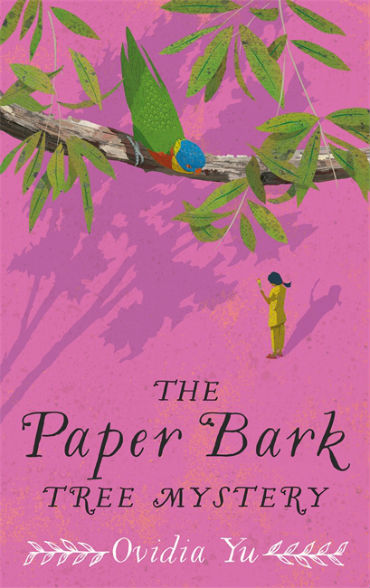It’s the latest decluttering fad that promises to spark joy into our lives through a ‘sort and purge’ process. But, writes the bestselling novelist Ovidia Yu, the KonMari Method is also the perfect antidote to every author’s worst nightmare - writer’s block.

What’s the KonMari method? Just the latest lifestyle craze. Basically, it states that if you only keep what sparks joy and put it in order after discarding everything else, your life as well as your closets will get miraculously sorted out.
I didn’t work out quite that way for me. I started trying to clear out my books (which are everywhere around here) and failed dismally, because it seemed every book I picked up sparked something, even if I wouldn’t call it ‘joy’, especially the traditional whodunit murder-mysteries passed down from my late mum and grandmother.
But it showed me a way to tackle my real problem, which was being stuck on the book I was writing, The Paper Bark Tree Mystery. (I tend to clean when I procrastinate. If the house looks clean, you know the writing’s not going well.) It wasn’t that I didn’t know what I wanted to write about. I had too many story ideas, too many interesting incidents to work in, had done too much research into stuff I didn’t want to waste, and had promised too many friends I would write them in (or kill someone on their behalf). Frankly, it was an overwhelming mass.
Facing a debilitating case of writer’s block, I applied KonMari’s decluttering philosophy to the book. I started with a brain-dump: the eloquent term I use to denote the act of getting everything out of the mind and down on paper. This I achieved with a wad of pink sticky notes. As I purged, the stuff naturally sorted itself into three categories. Here’s what I wrote (excluding the profanities):
1. What I love about traditional mysteries and should consider
- Someone dies, so characters are under stress and not just navel gazing.
- But no one really gets hurt, so I can sleep at night.
- There is someone I can love/ identify with/ enjoy spending reading time with.
- There’s a person or situation I can enjoy hating, so I get the adrenalin rush of rage every time he/she/it shows up and enjoy a cathartic thrill at its final defeat.
- There’s humour or a little romance for entertainment.
- And there’s a happy ending—or at least some kind of resolution at the end.
2. Specifics to be included
- Setting: Colonial Singapore, because I wanted to explore life under British rule. Also because I wanted a chance to set scenes in the beautiful old black-and-white mansions built in the Colonial days. Today they’ve mostly been converted into hotels or museums but it’s always been a fantasy to live in one.
- Old Trees, mostly because my grandmother loved trees. In her later years, when we took her out for a drive and asked her where she wanted to go, she always had old trees she remembered that she wanted to check up on. For me and my writing, it helps that there’s a tree directory (see https://www.nparks.gov.sg/trees) that lists 258 heritage trees in Singapore and gives their ages and locations.
3. Characters
- Chen SuLin, (who I like and would love to be more like. She’s slightly OCD before the term was invented and would have loved the KonMari method). SuLin was considered a ‘bad luck’ girl in her family, because she has a polio limp and dead parents. Instead of sending her away/having her drowned in a well, her grandmother sent her to English school to learn English.
- Bernie Hemsworth. The newly arrived administrator who has SuLin fired (because a local girl can’t be trusted) and replaced with Doris/Dolly, who can’t type but is pretty.
- And oh, because it was all happening around the time, the disappearance of Amelia Earhart’s plane, the appearance of an Indian terrorist suspected of murdering Dolly’s lover in Calcutta, illegally mined diamonds showing up in strange places and the shedding bark of the paperbark tree. The latter is actually a very useful tree in Singapore, with wood that repels bugs and sap that’s an ingredient in Tiger Balm lotion.
By the time I got these (and numerous other) points down, I had pretty much decided who to kill off and why and how. I’d decluttered and snapped the writer’s block clean in half. The process also helped me to understand the deeper reason why I love murder-mysteries. It can be so hard to deal with feelings about pointless deaths, whether due to illness, accident or violence, because most of the time it doesn’t make sense. Reading and writing murder stories gives me someone to get angry with, and the resolution gives a kind of closure that often doesn’t come in real life. While they don’t give death meaning, they allow me to explore the subject without too much pain.
I won’t tell you to read my book (though you should, of course read my book) but I will say try to write your own. Even if you don’t publish, after you’ve killed off a bunch of people who’ve been making you miserable, you’ll feel much better and without ending up in prison on death row.
And remember to throw everything into the mix before you KonMari it, because the messier it is at first, the more magical it will come out in the end.
The Paper Bark Tree Mystery (Constable) by Ovidia Yu is available from today in paperback and Kindle from Amazon UK. For more information visit www.ovidiayu.com

Q&A Interview with Ovidia Yu
In this exclusive interview, we chat with Singapore-based crime writer Ovidia Yu about the appeal of writing (and reading) whodunits, her favourite authors and her opinion on the greatest fictional detective of all time.

Though your books are set in Singapore, you write primarily in English. Did any British authors and books influence on your decision to go into crime writing?
I can only write in English. Having English as my native language is one of the limitations (or advantages) of living in a former British colony. I can read a little Malay and Chinese and I struggle to read French (reading French children’s books is how I quieten my monkey mind when I’m trying to go to sleep at night) but the language I’m most comfortable reading and writing in is English.
After all, I fell in love with crime fiction through British mystery writers such as Agatha Christie, Dorothy Sayers, E. C. Bentley, Margery Allingham—all who come from the British Golden Age of crime fiction.
But though we call it the ‘golden’ age, they were actually recovering from one war and under the shadow of the next. It was a time of great change and greater deprivations and I believe traditional crime fiction, where obvious bad guys are exposed and punished, was both escapism and comfort reading at the time.
Now that the world is changing even more dramatically, I think a lot of us are turning to fiction to understand our place in it—and other people. We’ve always found it easier to understand things through stories and parables that reflect our hopes, hunger and humour. And in crime fiction there’s also the shared premise that it’s wrong to kill other human beings.
Are any British crime writers still popular in Singapore?
More than ever! Though British crime shows may be more popular these days—Sherlock, Midsomer Murders, Inspector Morse and Endeavour, Vera—they may have shaped our impression of Britain, I’m afraid! You come for a visit and find not everyone lives in Downton Abbey or on Coronation Street—and you don’t all look like Benedict Cumberbatch or DI Vera Stanhope!
The good thing is, these shows lead back to the books. It was through TV that I discovered Ann Cleeves, who writes the Vera Stanhope books as well as the Shetland Island books and standalones like Wild Fire.
And I’ve discovered ‘British crime writers’ are not a homogenous team. I love Rhy Bowen’s Lady Georgie, Molly Murphy and Evan Evans books. But though all these are set in England, I believe she writes them in America so I’m not sure if you count her as a British crime writer—but I do.
The same applies to other British writers I love like Cathy Ace (Welsh-Canadian—the Cait Morgan and WISE Enquiries Agency books), Catriona McPherson (Scottish-American—the Dandy Gilver and Last Ditch Mysteries) and Sujata Massey (British American—the Perveen Mistry series and the wonderful Widows of Malabar Hill). And even Marsali Taylor (who writes the Cass Lynch and Gavin Macrae books in Britain) told me she identifies as being from the Shetlands!
When you come from somewhere as small as Singapore it’s hard to imagine the hugeness and diversity you have in Britain. But I’m coming to appreciate it, one book at a time!
What is the appeal of writing historical whodunits as opposed to those set in the present day, as with your Aunty Lee series?
The biggest appeal for me is exploring a period in the past that I find hugely exciting. And though it happened almost by chance, I’m seeing all kinds of patterns in Singapore then that are repeated in Singapore today. The way the British treated locals during the colonial days sounds terrible to us, but then you realise some locals today are treating migrant labourers and foreign domestic helpers just as badly.
With the perspective time gives, I see that maybe it wasn’t so much about the British being total racists as the people in charge having more power than responsibility.
And besides, I really like digging into what it must have been like to live in the past, in an age without social media and jet travel. A time when it seems life must have simpler and ‘right and wrong’ more straightforward.
What are your plans for the Crown Colony series, and Su Lin, going forward?
I would really like to follow Su Lin through the war years, and I’d really like to have her survive! I’d also like her to fall in love and get happily married (just to show up the dire warnings from fortune tellers).
People have asked me if she might end up with Thomas Le Froy or a Japanese Colonel after the war… I’m not ruling anything out, but I don’t think she’s ready yet and I’m not going to push her into anything till she is!
What’s the best writing advice you’ve ever received?
Many people say, ‘write what you know about’. But the best writing advice I’ve ever received was, ‘write what you want to know more about’. Curiosity is the best motivation I know of. And it’s a much more pleasant to call yourself ‘curious’ than kaypoh which is the Singlish term for ‘busybody’!
I’m most curious about what motivates people to do what they do, and how they relate to other people. Murder mysteries are just motives driven to the extreme. And if you approach life and writing with curiosity, you’re constantly asking ‘why?’ and ‘and then what?’ which is already halfway to getting your book down!
As a crime writer, are you good at solving the mysteries in other whodunits before the final page?
I’m afraid I’m pretty hopeless at solving other people’s mysteries! I get too distracted by characters—especially if I fall in love with them—and rooting for things to turn out well for my favourites. Maybe that’s why I enjoy reading so much!
Who do you consider the greatest fictional detective, and why?
I would call it a tie between Sherlock Holmes, Auguste Dupin and Monsieur Lecoq, simply because they were the earliest investigating detectives and set the tone for mystery novels as we know them now.
But it’s not just about being the ‘greatest’ and the fictional detective I love most is Agatha Christie’s sweet, shrewd Miss Marple. Though Ann Cleeves’ Vera Stanhope might be catching up!
What advice would you give someone who is interested in writing mysteries? In this age of social media is it worth writing books?
If you’re interested in writing mysteries, I’d guess you’re interested in reading mysteries. I’d say that alone shows it’s something worth doing. Social media is great for sharing material, but you still have to generate the stories.
I would advise you keep reading; just don’t stop at reading books you love. When you read things that don’t tell the whole story as you know it, or don’t ring true to your experience of the world, that may be your call to step in and set it right.
And this doesn’t just apply to reading mysteries. You mentioned social media—getting riled and firing off a response on social media might feel good for a day. Analysing what triggered you; exploring possible causes and likely consequences; working out an illustration of what justice might look like into a story that can be understood by a friend (or by ten thousand readers) will likely make you feel miserable for a great many days. But at the end of it, you’ll have created something that didn’t exist before. At the very least, you’ll understand yourself and your take on the issue better. At best, you find yourself a storyteller, entertaining, enlightening and inspiring others.

